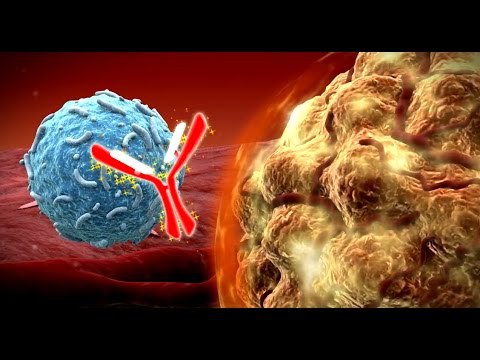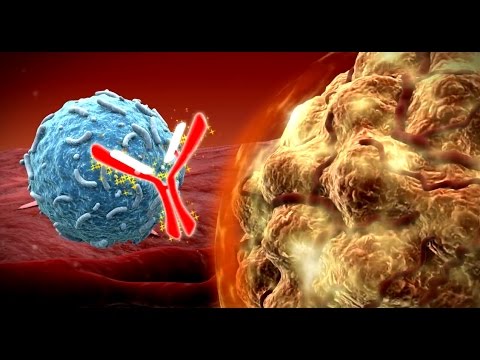
Two pharma companies race against each other to get a breakthrough in creating a new drug for cancer. Both the companies are at present researching on developing drugs accelerate the immune system's attack
Pfizer Inc, one of the leaders in the field of research for cancer immunotherapies was the first among the two companies to report early data of an "accelerator" treatment that targets a protein called 4-1BB.
However test drug still has to undergo stages of Phase I studies, some of which are either underway or planned.
The tests by Pfizer Inc are being conducted for solid tumor cancers and lymphomas, which are blood cancers.
Hot on the heels of Pfizer Inc, Bristol-Myers Squibb Co is in the early testing phases of a number of drugs of its own 4-1BB antibody. Other companies who are in the race include big names like Johnson & Johnson and AbbVie Inc which are in the early stages of trials before tests can be done on humans reports Reuters.
At present most of the effective drugs for cancer try and fight the disease by eradication of the brakes that stop functioning of the immune system in the body. The new tests are being carried out in the sphere of the disease that seeks to accelerate the immune system's attack.
“What they have shown are some pretty phenomenal responses in patients ... where you would not expect the drug to work very well because the patients had stopped responding to any available treatments,” said Dr. Holbrook Kohrt, a researcher from Stanford University Cancer Institute, referring to results from a small trial of Pfizer's treatment in patients whose lymphoma had progressed after they received several other therapies.
It was more than 20 years ago that the 4-1BB, also known as CD137, had been identified by scientists at the University of California San Diego. Efforts to develop a medicine in this field were put on hold after there were reports of dangerous signs of liver damage from the clinical trials of such a Bristol therapy. It was after 2008 that scientists managed to reduce the toxicity of the medical therapy by significantly lowering doses of a 4-1BB antibody and administering the drug at the right time.
Scientists are of the opinion that a very lucrative market for cancer drugs would open up if the new trials become successful as the new drugs could work for many types of cancers.
Tests of the new drug being prepared by Bristol and Merck & Co uses a potent drug that blocks a protein known as PD-1. This protein is the cause of tumors remaining undetected by the immune system of the body use. Tests have reportedly indicated some patients living for years even with advanced stage diseases like melanoma, which had nearly always meant death within months.
The tests for the new drugs are being carried out in combination with many other drugs with the aim that these drugs would work for a wider group of patients and potentially improve the duration of responses from the drugs.
The immuno-oncology market is expected to reach $40 billion by 2025, according to industry analysts.
(Source: www.reuters.com)
Pfizer Inc, one of the leaders in the field of research for cancer immunotherapies was the first among the two companies to report early data of an "accelerator" treatment that targets a protein called 4-1BB.
However test drug still has to undergo stages of Phase I studies, some of which are either underway or planned.
The tests by Pfizer Inc are being conducted for solid tumor cancers and lymphomas, which are blood cancers.
Hot on the heels of Pfizer Inc, Bristol-Myers Squibb Co is in the early testing phases of a number of drugs of its own 4-1BB antibody. Other companies who are in the race include big names like Johnson & Johnson and AbbVie Inc which are in the early stages of trials before tests can be done on humans reports Reuters.
At present most of the effective drugs for cancer try and fight the disease by eradication of the brakes that stop functioning of the immune system in the body. The new tests are being carried out in the sphere of the disease that seeks to accelerate the immune system's attack.
“What they have shown are some pretty phenomenal responses in patients ... where you would not expect the drug to work very well because the patients had stopped responding to any available treatments,” said Dr. Holbrook Kohrt, a researcher from Stanford University Cancer Institute, referring to results from a small trial of Pfizer's treatment in patients whose lymphoma had progressed after they received several other therapies.
It was more than 20 years ago that the 4-1BB, also known as CD137, had been identified by scientists at the University of California San Diego. Efforts to develop a medicine in this field were put on hold after there were reports of dangerous signs of liver damage from the clinical trials of such a Bristol therapy. It was after 2008 that scientists managed to reduce the toxicity of the medical therapy by significantly lowering doses of a 4-1BB antibody and administering the drug at the right time.
Scientists are of the opinion that a very lucrative market for cancer drugs would open up if the new trials become successful as the new drugs could work for many types of cancers.
Tests of the new drug being prepared by Bristol and Merck & Co uses a potent drug that blocks a protein known as PD-1. This protein is the cause of tumors remaining undetected by the immune system of the body use. Tests have reportedly indicated some patients living for years even with advanced stage diseases like melanoma, which had nearly always meant death within months.
The tests for the new drugs are being carried out in combination with many other drugs with the aim that these drugs would work for a wider group of patients and potentially improve the duration of responses from the drugs.
The immuno-oncology market is expected to reach $40 billion by 2025, according to industry analysts.
(Source: www.reuters.com)





